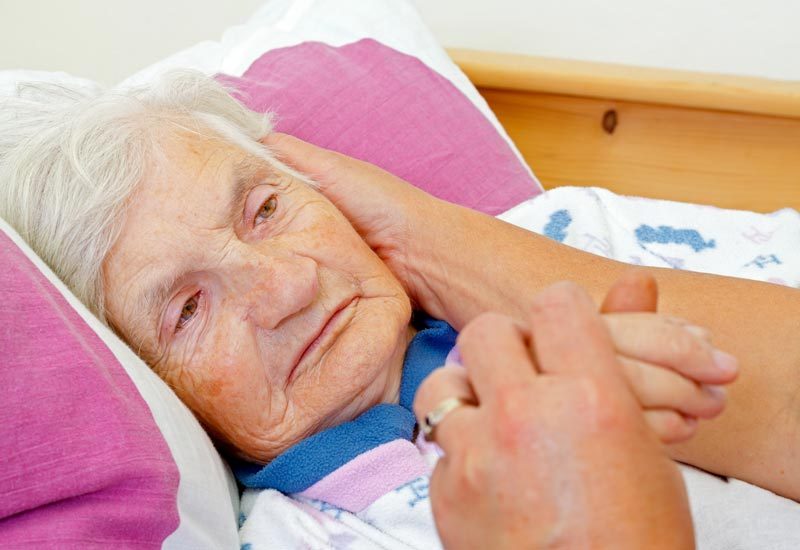Hospice programs are available to help terminally ill individuals live their remaining days with dignity. These programs can assist the family (or other designated caregiver) in making the patient as comfortable as possible, and assistance is available around the clock, seven days a week.
Hospice is primarily a concept of care, not a specific place of care. Hospice care usually is provided in the patient’s home. It also can be made available at a special hospice residence. Hospice is a combination of services designed to address not only the physical needs of patients, but also the psychosocial needs of patients, their loved ones.
Hospice combines pain control, symptom management and emotional and spiritual support. Seniors and their families participate fully in the health care provided. The hospice team develops a care plan to address each patient’s individual needs. The hospice care team usually includes:
- The terminally ill patient and his or her family caregiver(s)
- Doctor
- Nurses
- Home health aides
- Clergy or other spiritual counselors (e.g., minister, priest, rabbi)
- Social workers
- Volunteers (if needed, and trained to perform specific tasks)
- Occupational, physical, and/or speech therapists (if needed).
WHEN IS HOSPICE CARE APPROPRIATE?
As with many end-of-life decisions, the choice to enroll in a hospice care program is a deeply personal thing. It depends almost as much on the patient’s philosophy of living and spiritual beliefs as it does on his or her physical condition and the concerns of family members. The following case study shows how one patient decided that hospice care was what she wanted and why it was right for her.
HOW CAN I PAY FOR HOSPICE CARE?
Medicare, private health insurance, and Medicaid (in 43 states) cover hospice care for patients who meet eligibility criteria. Private insurance and veterans’ benefits also may cover hospice care under certain conditions. In addition, some hospice programs offer health care services on a sliding fee scale basis for patients with limited income and resources. To get help with your Medicare questions, call 1-800-MEDICARE (1-800-633-4227, TTY/TDD: 1-877-486-2048 for the speech and hearing impaired) or look on the Internet at www.medicare.gov. Additional information about how to pay for hospice care can be found at the Public Policy Institute of the AARP
WHERE CAN I LEARN MORE ABOUT HOSPICE CARE?
Caring Connections, a program of the National Hospice and Palliative Care Organization (NHPCO), is a national consumer and community engagement initiative to improve care at the end of life. The program offers a web site and a HelpLine 800-658-8898. Visit http://www.hospiceinfo.org to learn more. Another resource is the Hospice Foundation of America, which can be reached by calling 1-800-854-3402 or by visiting the organization’s website at http://www.hospicefoundation.org.
The Hospice Association of America provides information about hospice programs and how terminally ill patients and their families can find hospice services in their area. Call 202-546-4759 or visit the association’s website at http://www.nahc.org/HAA/consumerInfo.html. Hospice Net at http://www.hospicenet.org is one more website where you can get information about how to find a hospice that is right for you.
To find out more about hospice programs where you live, you can contact your local aging information and assistance provider or area agency on aging (AAA). The Eldercare Locator, a public service of the Administration on Aging (at 1-800-677-1116 or http://www.eldercare.gov) can help connect you to these agencies.
Case Study
Lynda was 57 years old when she was diagnosed with liver cancer. In spite of the best medical treatment her doctors could provide, her cancer proved incurable. Although the prospect of dying frightened her, Lynda wanted to receive professional assistance to prepare herself and her family for her death.
She realized that she wanted to be cared for at home by her sister, Sara. The local hospice service made the arrangements so that this would be possible. Hospice staff made sure that Lynda’s family would have the equipment they needed, and trained Sara in how to administer medications to relieve Lynda’s pain. The hospice program also sent a registered nurse to the house to oversee Lynda’s care, and the nurse consulted with a doctor to make sure Lynda was as comfortable as she could be during her final weeks. In addition, the hospice service sent a personal care attendant to bathe Lynda twice a week, and a social worker and a clergyman to provide spiritual and grief counseling for Lynda and Sara. Lynda lived the last six weeks of her life at home before she passed away surrounded by Sara and the rest of her family.
OTHER FAMILY COUNSELING AND SUPPORT SERVICES
Seniors and family caregivers facing end-of-life decisions often must deal with very difficult issues of grief and loss—both before and after their loved one dies.
In addition, they may have practical concerns about their legal rights and how to pay the bills now that an important member of the household is gone.
To help families prepare for a loved one’s death (and to support them afterwards), the following organizations offer resources that address everything from family counseling to financial planning:
Americans for Better Care of the Dying was founded in 1997 to help ensure that every terminally ill patient can count of good end-of-life care. It publishes several books on how to deal with mortality (death) and what health care alternatives (including hospice care) are available for seniors. The group can be reached by visiting its website at: http://www.abcd-caring.org/
Family Caregiver Alliance supports and assists caregivers of brain-impaired adults through education, research, services and advocacy. They have facts sheets available on a variety of topics including end-of-life issues. The fact sheets are available on the organization’s website at: http://www.caregiver.org/






